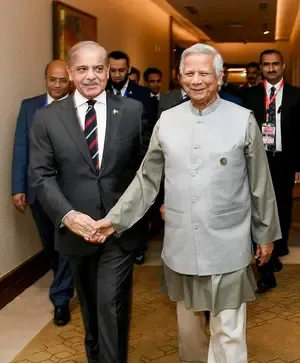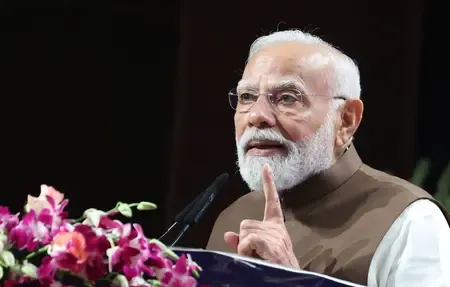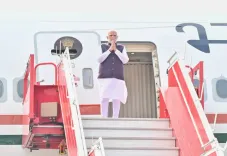Could ISI-Driven Meetings Lead to Visa-Free Access Between Pakistan and Bangladesh?

Synopsis
Key Takeaways
- Visa-free access for diplomatic officials raises security concerns.
- ISI's influence in Bangladesh is significant.
- Potential for terrorism increases along Indo-Bangladesh borders.
- Policy shift in Bangladesh under Yunus aligns with Pakistan.
- Historical ties between ISI and DGFI affect regional stability.
Bengaluru, July 26 (NationPress) The recent agreement between Pakistan and Bangladesh to permit visa-free entry for holders of diplomatic and official passports raises serious concerns for India. This development is largely attributed to the significant influence exerted by the ISI to facilitate this arrangement.
Granting visa-free access for diplomatic officials implies unrestricted entry with minimal scrutiny. This reduced oversight is advantageous for the ISI, enabling the movement of its officials into Bangladesh with little to no examination.
Since the removal of Sheikh Hasina, the ISI has effectively turned Bangladesh into a strategic playground. Pakistan has been dispatching operatives from Jaish-e-Mohammad and Lashkar-e-Tayiba to train terrorist factions within Bangladesh.
The ISI appears to have a long-term strategy aimed at undermining India on two fronts. While India contends with terrorism from Pakistan along the Line of Control (LoC), the ISI aims to instigate similar turmoil along the Indo-Bangladesh border.
Following Muhammad Yunus' ascension as the interim leader of the caretaker government, a considerable shift in policy has occurred. The nation has effectively granted a free hand to the ISI and the Pakistan Army, while also aligning more closely with China and Turkey.
Since taking office, Yunus has not only relaxed visa regulations for Pakistanis but has also opened maritime routes. This altered landscape benefits Pakistan by facilitating the movement of its operatives with minimal oversight.
Intelligence analysts assert that these measures were adopted at the behest of the ISI and the Pakistan Army, both of which are known to utilize active personnel for terrorist training within various camps in Pakistan and Pakistan-occupied Kashmir.
For instance, during the 26/11 Mumbai attacks, Sajid Mir, a serving officer of the ISI, acted as the handler. Pakistan had also deployed officials from its navy and army to train the ten assailants responsible for the Mumbai attacks.
While such operations occurred within Pakistan, where officials faced no travel restrictions, the situation concerning Bangladesh presents a different scenario.
The latest agreement to permit visa-free travel for diplomatic and official passport holders provides the ISI and the army straightforward access to Bangladesh. For these officials, traveling to Bangladesh would resemble traveling within their own nation.
This new arrangement was established during a meeting between Interior Minister Mohsin Naqvi and his Bangladeshi counterpart, Lieutenant General (retired) Jahangir Alam Chowdhury, in Dhaka.
However, prior to this agreement, the ISI and DGFI had collaborated on a strategy that culminated in the signing of this deal.
Before this pivotal decision, the ISI dispatched four senior officials to Dhaka. The delegation, led by Major General Shahid Amir Afsar, Director General of Analysis, advocated for the Bangladesh administration to ease visa restrictions, allowing their officials to enter the country with minimal scrutiny.
Yunus, facing limited options, is beholden to the Jamaat-e-Islami, which operates as a proxy for Pakistan. His rise to power resulted from student protests against Hasina, led predominantly by the Islamic Chhatra Shibir, the student wing of the Jamaat. As such, he must comply with the Jamaat, which is classified as a banned terrorist organization in India.
During their January visit, the ISI delegation traversed Bangladesh and even convened with the three service chiefs. The issue of relaxing visa regulations was also discussed in April during a meeting between the DGFI and an ISI official in Spain.
Since the 1971 war, the DGFI and ISI have maintained a collaborative relationship. After the war, these agencies initiated a significant illegal immigration infiltration campaign aimed at altering demographics in India and instigating communal unrest.
However, this alliance had been largely subdued due to successive democratically elected leaders in Bangladesh. Many leaders had opted to keep Pakistan at arm's length, a strategy that was most effectively implemented under Sheikh Hasina.
Yet, with her removal, the dynamics have shifted dramatically, and Pakistan seeks to recreate a pre-1971 Bangladesh.
India is closely monitoring these developments, as they directly impact security along the eastern and northeastern borders, which have long been targets for terrorist factions operating from Bangladesh.









